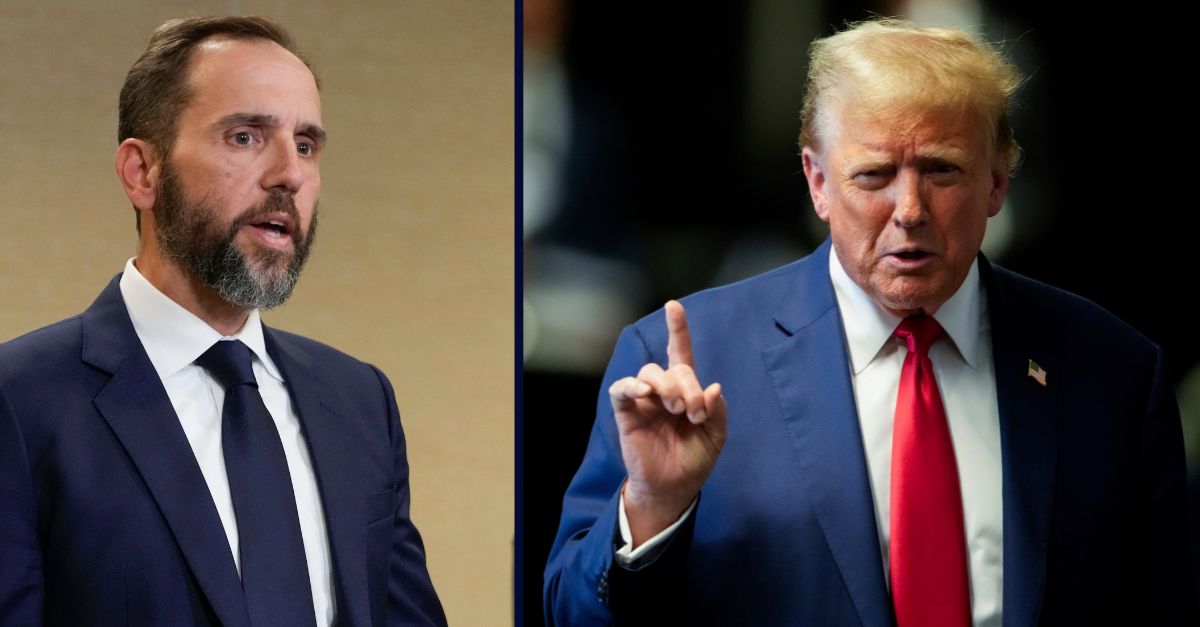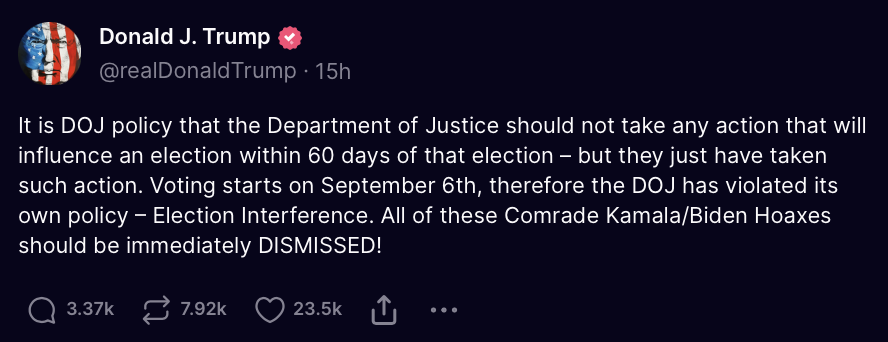
Left: Jack Smith speaks about an indictment of former President Donald Trump, Aug. 1, 2023, at a Department of Justice office in Washington (AP Photo/Jacquelyn Martin, File); Right: Donald Trump speaks to members of the media before departing Manhattan criminal court, Monday, May 6, 2024, in New York. (AP Photo/Julia Nikhinson, Pool)
After taking a post-Supreme Court immunity ruling scalpel to its Jan. 6 case and presenting it to a different grand jury, special counsel Jack Smith on Tuesday filed a superseding indictment charging former President Donald Trump with the same offenses, in order to continue to prosecution first indicted in August 2023. In response, Trump quickly blasted the DOJ for “violat[ing] its own policy,” the so-called “60-day rule,” but does it really apply here?
In the view of former federal prosecutor Randall Eliason, a George Washington University law professor, it’s clear that rule doesn’t apply and even if it did, the violation of an unwritten internal DOJ rule without a “legally binding requirement” wouldn’t “give Trump a legal remedy.”
Trump’s social media post reaction is similar to a complaint that was already aired in the special counsel’s since dismissed Mar-a-Lago prosecution back in March, when the defense told Judge Aileen Cannon that the DOJ, by pushing for an Espionage Act trial during an election year, failed to avoid “Actions that May Have an Impact on an Election” in violation of Justice Manual § 9-85.500.
That section says federal prosecutors and agents “may never select the timing of any action, including investigative steps, criminal charges, or statements, for the purpose of affecting any election, or for the purpose of giving an advantage or disadvantage to any candidate or political party.”
At the time, the DOJ said there was no issue with setting a Mar-a-Lago trial date before the 2024 election, as the case was indicted in June 2023, well before the heat of the presidential campaign and the election, and the case was actively litigated ever since, so the “60-day rule” was not implicated.
On Tuesday, Trump responded to news of the Jan. 6 superseding indictment by saying that the act of filing of the documents in itself violated violated the “60-day rule” since, for example, absentee ballots will go out in North Carolina on Sept. 6.

“It is DOJ policy that the Department of Justice should not take any action that will influence an election within 60 days of that election – but they just have taken such action,” Trump posted Tuesday on Truth Social. “Voting starts on September 6th, therefore the DOJ has violated its own policy – Election Interference. All of these Comrade Kamala/Biden Hoaxes should be immediately DISMISSED!”
The post prompted Lawfare’s Anna Bower to revisit the arguments of Trump lawyers and prosecutors from March, while noting that “60 day rule” is not a “formal rule or policy” and the 2024 election itself is more than 60 days away at any rate.
Additionally, there is no formal rule or policy barring Justice Department action in the days before an election. Rather, the “60-day rule” is more of a soft norm.
Also, there are 69 days until the 2024 presidential election.
— Anna Bower (@AnnaBower) August 27, 2024
Eliason responded to Bower that the “60 day rule” is “really just a voluntary guideline and not a legal requirement,” that it “does not apply to a case that is already indicted and public,” and that typically around Labor Day is when the unwritten rule kicks in.
Reached for additional comment by Law&Crime, Eliason said the rule isn’t just inapplicable to Trump’s case, it also wouldn’t help him legally if it did apply.
Explaining that the “60-day rule” is a kind of “rule of thumb” for complying with Justice Manual § 9-85.500, to “avoid even a perception” of political maneuvering “regardless of whether that was the purpose,” Eliason emphasized first that the superseding indictment doesn’t contain any new information, only less information — to tailor it to Supreme Court’s instructions on purging it of “official acts” references.
“The rule is that prosecutors should avoid new, overt investigative steps that might influence an election, such as returning a new indictment or executing a search warrant. The purpose is to avoid coming out with new information at the relatively last minute that might influence the voters and thus giving the appearance of attempting to influence the election,” Eliason said. “That doesn’t apply in a situation like this, when the charges and factual allegations are already public and have been for some time. There is no new information here that could sway the voters that was not already known. The purpose here was strictly legal, to seek to comply with the new requirements announced by the Supreme Court.”
The second problem for Trump, Eliason said, is that “[w]e are more than 60 days out from the November election, so even if the rule applied Smith would be in compliance.”
A third issue? Even if the rule applied, it’s not something that would hand Trump a “legal remedy” because compliance with a “voluntary practice that the DOJ has adopted as a matter of discretion” is “not binding or legally enforceable,” Eliason said.
He added that the manual itself “expressly provides that these are internal policies and do not provide any rights to third parties – in other words, a defendant cannot move to dismiss an indictment based on any alleged failure to follow those policies.”
In an introduction, the DOJ manual does include language that says it is “not intended to, does not, and may not be relied upon to create any rights, substantive or procedural, enforceable at law by any party in any matter, civil or criminal.”
Have a tip we should know? [email protected]







